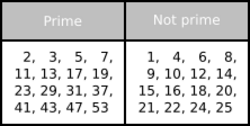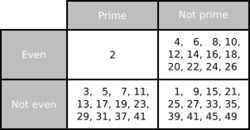Carroll diagram
A Carroll diagram, Lewis Carroll's square, biliteral diagram or a two-way table is a diagram used for grouping things in a yes/no fashion. Numbers or objects are either categorised as 'x' (having an attribute x) or 'not x' (not having an attribute 'x'). They are named after Lewis Carroll, the pseudonym of polymath Charles Lutwidge Dodgson.[1][2]
Usage
Although Carroll diagrams can be as simple as the first one above, the most well known types are those similar to the second one, where two attributes are shown. The 'universe' of a Carroll diagram is contained within the boxes in the diagram, as any number or object has to either have an attribute or not have it.
Carroll diagrams are often learnt by schoolchildren, but they can also be used outside the field of education, since they are a tidy way of categorising and displaying information.
See also
References
- ↑ "Venn and Carroll Diagrams". Mathematical Tale Winds. Faculty of Education, University of Winnipeg, Winnipeg, Canada. 2010. http://ion.uwinnipeg.ca/~jameis/Math/L.venn/LEY1.html.
- ↑ "Diagrams". The Stanford Encyclopedia of Philosophy (SEP). 2013-09-17. http://plato.stanford.edu/entries/diagrams/.
Further reading
- The Logic Diagram (Thesis). McMaster University. October 1967. https://macsphere.mcmaster.ca/bitstream/11375/10794/1/fulltext.pdf. Retrieved 2017-04-14.
- "Foreword". Cogwheels of the Mind: The Story of Venn Diagrams. Baltimore, Maryland, USA: Johns Hopkins University Press. 2004. ISBN 0-8018-7434-3. https://books.google.com/books?id=7_0Thy4V3JIC&pg=PA65.
External links
- Bogomolny, Alexander (2017). "Lewis Carroll's Logic Game". Cut-the-knot. http://www.cut-the-knot.org/LewisCarroll/index.shtml.
- "Carroll Diagram (and Game of Logic) Interactive Demonstrator at lewiscarrollresources.net". http://lewiscarrollresources.net/gameoflogic.
- Lewis Carroll: Logic, Internet Encyclopedia of Philosophy
 |



